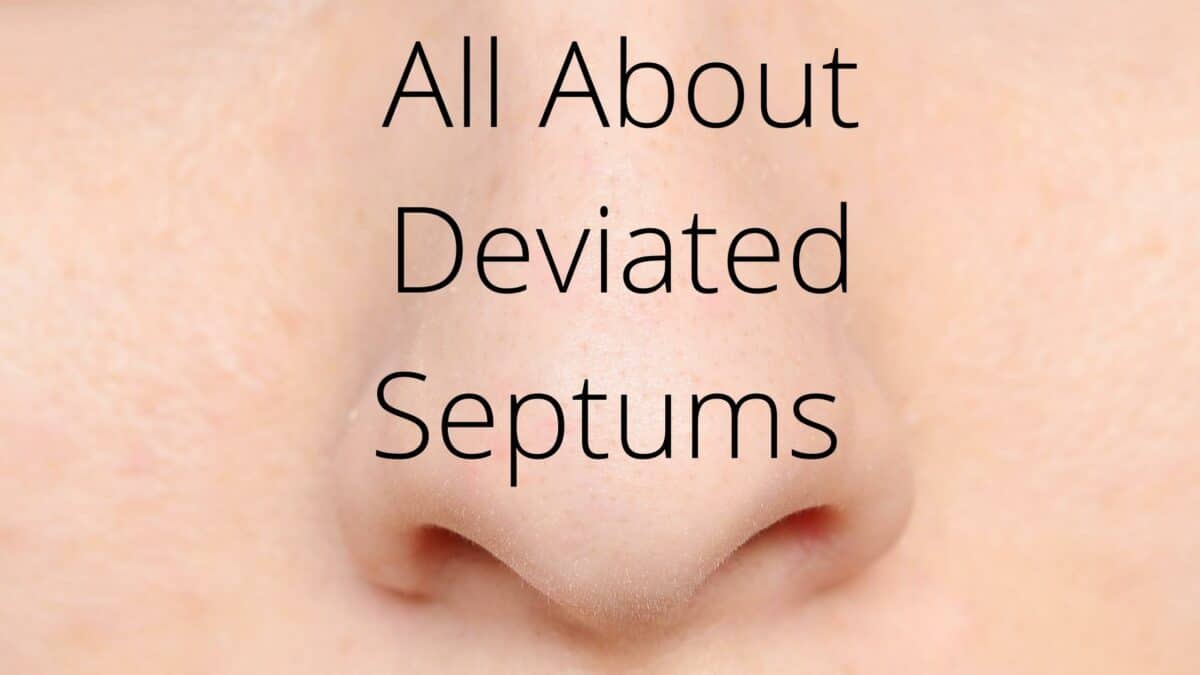Does the person you share your bed with complain that you snore? Do you suffer from nasal congestion and repeated nasal infections? These two conditions are often related.
What is a Deviated Septum?
A deviated septum simply means that your nasal septum is not centered, and this occurs in at least 80% of all people. Symmetry is rarer than we would first suspect. The septum is made of bone and cartilage and creates division in each of our nostrils.
The Role of the Septum
While an uneven septum doesn’t immediately signify that you will have chronic breathing and sleeping issues, it often can be a contributing factor. For the most optimal airflow, both nostrils on the right and left sides should be even. If the septum is just a little bit off-center it should not be a big difference but in more extreme instances when the septum is offset to one side enough to restrict breathing through one nostril it can impact several aspects of our health.
Causes of Deviated Septums
Most people with deviated septums are born this way and occurred during fetal development. Perfect symmetry is not always achievable and rarer than perfectly balanced nostrils. In some instances, however, the septum can become deviated due to impact-based injuries, such as falls, sports injuries, car accidents, and head traumas.
How to Know when a Deviated Septum is an Issue
Most people don’t have a big issue living with a deviated septum. In some cases, it can make you more susceptible to nose bleeds, snoring, and sinus infections. When it gets bad, it can be the cause of frequent headaches, difficulty breathing, facial pain, and sleep disorders. For instance, seasonal allergies can take a toll on anyone’s well-being. 30 percent of people in the US have to suffer through hay fever during the height of spring and fall every year. However, if you have a deviated septum, you may be more likely to suffer frequently and symptoms can be pronounced.
Deviated Septum and Sleep Apnea
A deviated septum may also cause you to suffer serious sleep issues including sleep apnea. Obstructive sleep apnea occurs when the throat closes intermittently throughout sleep. People with a deviated septum may also breathe through their mouths at night in an attempt to get more air causing more severe sleep apnea. Sleep apnea can interrupt sleep, making it hard to stay focused during the day However, it can be more serious than that. Sleep apnea in effect interrupts the oxygen flow to the brain and heart putting people at a higher risk for stroke, heart attack, hypertension and even increasing the risk of dementia.
Addressing Deviated Septums
Depending on the degree of your deviated symptom and side effects experienced can dictate the treatment. If you suffer from severe allergies and frequent nasal infection decongestants, allergy medications and nasal sprays can limit the effect it has on you. You’ll be able to clear up your runny nose and focus on your day.
If your deviated septum is causing sleep apnea, then it must first be diagnosed through a sleep study where your air intake and neural activity are measured overnight while you rest. Usually, you won’t even know you have an issue for years unless a partner notices it. It is most often treated using a sleep machine that fits over the nose or nose and mouth and stabilizes breathing.
Surgical Intervention
In some instances, septums are deviated or crooked enough to warrant surgery to ease breathing. The most common surgery for correcting deviated septums is septoplasty
– a surgery in which an Ear Nose and Throat (ENT) specialist will make a small incision in the nose and remove excess bone or cartilage to correct the problem. This can realign the septum and correct chronic breathing and sleep issues.
Addressing Your Breathing Needs
If you suspect that you have a deviated septum and it’s affecting how you breathe, it is a good idea to reach out to us for an examination. We can diagnose the severity of your breathing issues and troubleshoot the best option for you. Together we can help you get through allergy season with more ease and address any chronic sleep issues which may be threatening your overall health and well-being. Schedule an appointment today!

